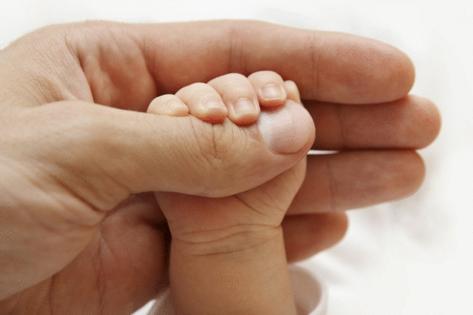Erin Lowry: The real reason you're grieving not being a grandparent
Published in Op Eds
For many parents in middle age and beyond, the prospect of having grandchildren awaits as one of life’s undisputed joys. What could be controversial about wanting to deepen familial ties and savor spending time with one’s adorable progeny — this time without middle-of-the-night feedings?
Yet the longing for grandchildren became cannon fodder recently on social media. In posts that ranged from funny to outraged, millennials and Gen Zers scoffed at the notion, described in a recent New York Times story, that a growing number of aging parents of adult children were experiencing “unspoken grief” about the possibility that they would never become grandparents as their own children opt out of parenthood.
While some posters empathized with their elders’ disappointment, they also rejected the idea that they might be selfishly depriving their parents of a cherished life stage.
These frustrated millennials and Gen Zers have an important message. They entered adulthood at a time when conditions could hardly be less welcoming for young families. The cost of raising children — especially for child care and housing — has skyrocketed, while the demands of a well-paying career make it hard to imagine how to fit children into the picture.
Add to that the lack of a solid safety net or reliable care during pregnancy, including women being denied lifesaving medical care during miscarriages in states with abortion bans. And then there are the grim threats of climate change and gun violence.
So it’s hardly surprising that American women are having fewer children. The fertility rate hit a record low in 2023. Women are having an average of 1.62 children, down from 2.12 births in 2007, according to the Centers for Disease Control and Prevention.
Fewer children ultimately means fewer grandchildren. The number of aging parents who become grandparents dropped to 50% in 2023 from 58% a decade earlier, according to an analysis by the National Center for Family & Marriage Research at Bowling Green State University
Things could get worse for young parents as Donald Trump returns to the White House and Republicans assert control of Congress. With only “concepts of a plan” from Trump regarding health care, no meaningful plans to make child care affordable, a promise to sign a nationwide “concealed carry reciprocity” gun law and a campaign-trail pledge to abolish the Department of Education, parents are right to be worried about potential costs and safety of raising children.
While closing a cabinet-level agency might be out of reach for Trump, any cut to federal education spending would make life tougher for parents and children, especially in impoverished and rural areas. States are largely responsible for funding public education, but the federal government contributes about 8% of the funds for elementary and secondary education, often focused on responding to critical needs. Schools also rely on funds from the U.S. Department of Agriculture, which supports school lunch and snack programs that some Republicans in Congress have threatened to cut.
Cutting Department of Education funds also could put federal student loans for college at risk, making college unaffordable for millions or requiring students to take on private student loans, which come with fewer protections and potentially higher interest rates.
The United States already is regressive when it comes to parental leave, and one of only a few nations without a national paid maternity leave policy. (The Family Medical Leave Act offers job security but is unpaid.) Paid leave is essential, for fathers as well as mothers. Unfortunately, policymakers don’t have a strong history of leading by example. Representative Colin Allred, a Texas Democrat, was the first man in Congress to take paternity leave back in 2019.
There has been some bipartisan interest in paid family and medical leave legislation, but little progress has been made. Notably, Trump did support and sign paid leave for federal workers in his first term, which was bundled into a defense bill. But he didn’t make parental leave part of his campaign trail promises.
One glimmer of hope is that three states on Election Day passed ballot measures guaranteeing most workers paid sick leave. Notably, all three — Alaska, Missouri and Nebraska — are red states. They join 18 others and the District of Columbia requiring at least some paid sick leave for workers. While the possibility of a federal law mandating meaningful sick leave appears remote, the Election Day successes show the possibility for more action at the state level, including paid parental leave.
We might not see policies that make parenthood feasible for more people anytime soon. But whatever happens at the political level, parents of adult children need to make peace with their children’s decisions around family planning. That doesn’t have to involve lengthy conversations proselytizing the benefits and virtues of becoming a parent. Nor does it need to become an investigation into whether the way an adult child was raised is the reason they don’t want children. In fact, it doesn’t need to be a conversation at all. A person’s family-planning choices should only be discussed if the prospective parent initiates the conversation.
Millennials and Gen Z need to do everything possible to push for more family-friendly policies. While paid leave would be a good start, it only affects the earliest weeks of the child’s life. Affordable child care and housing along with access to public education are just as vital for parents.
It will fall to the youngest voting-eligible adults to put pressure on the government to enact change that will set up future generations of parents. Shouldn’t parents hope that their own children have an easier time if they choose to become parents?
_____
This column does not necessarily reflect the opinion of the editorial board or Bloomberg LP and its owners.
Erin Lowry is a Bloomberg Opinion columnist covering personal finance. She is the author of the three-part “Broke Millennial” series.
_____
©2024 Bloomberg L.P. Visit bloomberg.com/opinion. Distributed by Tribune Content Agency, LLC.




























































Comments